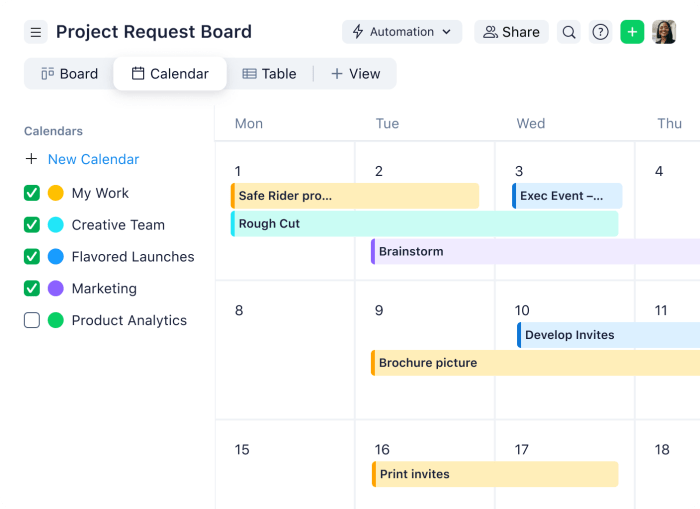Building a Marketing Calendar sets the foundation for strategic planning and organization in the world of marketing. From outlining key components to implementing and managing, this guide covers it all.
Importance of a Marketing Calendar

In the fast-paced world of business, having a marketing calendar is crucial for success. It serves as a roadmap that guides businesses in achieving their marketing goals effectively and efficiently. Let’s delve into why a marketing calendar is so essential.
Organization and Planning
A marketing calendar helps businesses in planning and organizing their marketing activities in a structured manner. By laying out all the marketing campaigns, promotions, and events in advance, businesses can ensure that every activity is well-coordinated and aligns with their overall marketing strategy.
- Keeps track of important dates and deadlines.
- Helps in allocating resources efficiently.
- Ensures a consistent brand message across all marketing channels.
Benefits of a Structured Marketing Calendar, Building a Marketing Calendar
Having a structured marketing calendar offers numerous benefits to businesses, enabling them to stay ahead of the competition and connect with their target audience effectively.
- Improves time management and productivity.
- Facilitates better decision-making based on data and insights.
- Enhances collaboration among team members and departments.
Components of a Marketing Calendar: Building A Marketing Calendar
Marketing calendars are essential tools for planning and organizing your marketing efforts. They help keep your team on track, ensure consistency in messaging, and maximize the effectiveness of your campaigns. Here are some key components to include in a marketing calendar:
Key Elements to Include
- Important Dates: Include holidays, industry events, product launches, and other significant dates that may impact your marketing strategy.
- Campaign Details: Clearly Artikel the goals, target audience, messaging, channels, and budget for each campaign.
- Content Plan: Schedule blog posts, social media updates, email campaigns, and other content to support your marketing initiatives.
- Assigned Responsibilities: Specify who is responsible for executing each task to ensure accountability and coordination within your team.
Types of Content/Campaigns to Schedule
- Social Media Posts: Plan out the frequency and timing of your social media updates to engage with your audience consistently.
- Email Campaigns: Schedule email blasts, newsletters, and automated campaigns to nurture leads and drive conversions.
- Strategy: Allocate time for research, content optimization, and link building activities to improve your search engine rankings.
- Advertising Campaigns: Coordinate the timing and messaging of your paid advertising efforts across various platforms to maximize ROI.
Tools and Software for Creating and Maintaining a Marketing Calendar
- Google Calendar: A free and easy-to-use tool for creating a basic marketing calendar that can be shared with team members.
- Trello: A project management tool that allows you to create boards and cards to visually organize your marketing tasks and campaigns.
- CoSchedule: A comprehensive marketing calendar tool that integrates with popular platforms like WordPress, social media, and email marketing services for seamless planning and execution.
- Asana: A versatile project management tool that enables you to create tasks, assign deadlines, and track progress for all your marketing initiatives.
Creating a Marketing Calendar
Creating a marketing calendar is essential for planning and organizing your marketing efforts effectively. It helps ensure consistency, alignment with business goals, and timely execution of campaigns. Here are some step-by-step tips for setting up a marketing calendar:
Define Your Goals and Objectives
- Start by identifying your business goals and marketing objectives. What do you want to achieve through your marketing efforts?
- Set specific, measurable, achievable, relevant, and time-bound (SMART) goals to guide your marketing calendar.
- Align your goals with your overall business strategy to ensure that your marketing activities support your company’s growth.
Identify Your Target Audience
- Understand your target audience’s demographics, behaviors, preferences, and needs. This will help you tailor your marketing messages and strategies effectively.
- Create buyer personas to represent different segments of your target audience and use them to guide your marketing calendar planning.
- Segment your audience based on factors like age, gender, location, interests, and purchase history to deliver personalized and relevant content.
Choose the Right Marketing Channels
- Consider the most effective marketing channels for reaching your target audience. This could include social media, email marketing, content marketing, , PPC, and more.
- Select channels that align with your budget, resources, and audience preferences to maximize the impact of your marketing efforts.
- Diversify your marketing channels to reach a wider audience and increase brand visibility across multiple platforms.
Implementing and Managing a Marketing Calendar

Implementing and managing a marketing calendar effectively is crucial for ensuring the success of your marketing strategies within a team or organization. It helps in keeping everyone on the same page, staying organized, and meeting deadlines consistently.
Implementing a Marketing Calendar
When implementing a marketing calendar, it is essential to involve all relevant team members to ensure alignment and collaboration. Here are some steps to effectively implement a marketing calendar:
- Assign clear roles and responsibilities to team members for updating and following the calendar.
- Choose a reliable tool or platform for creating and sharing the calendar, such as Google Calendar or project management software.
- Set clear goals and objectives for each marketing activity to be scheduled in the calendar.
- Establish a regular schedule for updating the calendar and conducting team meetings to discuss progress and make necessary adjustments.
Managing and Updating a Marketing Calendar
Managing and updating a marketing calendar regularly is essential to ensure that your marketing activities are on track and aligned with your overall strategy. Here are some strategies for effective management:
- Regularly review and update the calendar based on changing priorities, market trends, and feedback from previous campaigns.
- Communicate any changes or updates to the team promptly to avoid confusion and ensure everyone is aware of the latest updates.
- Use color-coding or labels to categorize different types of activities and campaigns for better organization and visibility.
- Automate reminders and notifications to keep team members informed about upcoming deadlines and tasks.
Monitoring Marketing Calendar Performance
Monitoring the performance of marketing activities scheduled in the calendar is essential to track the effectiveness of your strategies and make data-driven decisions. Here are some insights on monitoring performance:
- Track key performance indicators (KPIs) such as website traffic, conversion rates, and ROI to measure the success of each marketing activity.
- Regularly analyze data and metrics to identify trends, patterns, and areas for improvement in your marketing campaigns.
- Collaborate with team members to discuss performance reports and brainstorm ideas for optimizing future campaigns based on data insights.
- Adjust the marketing calendar as needed based on performance data to capitalize on successful strategies and pivot from ineffective ones.